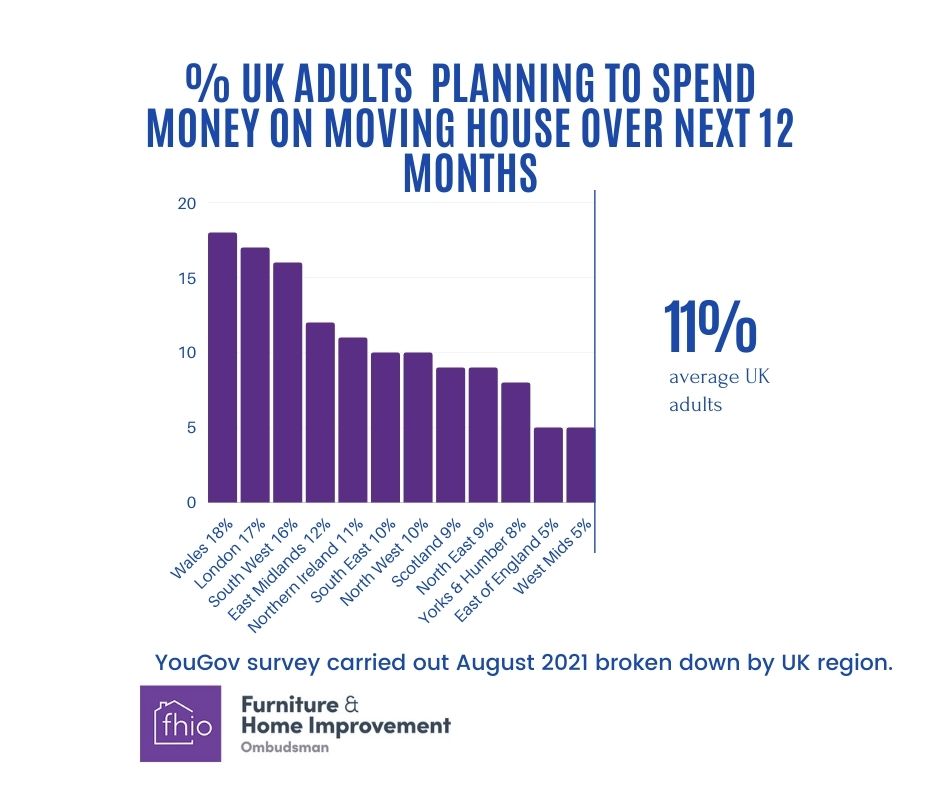MOVING HOUSE? Here are the keys to success…

WORLD SUICIDE PREVENTION DAY
25th August 2021
Recycle Week 2021
25th August 2021• New research highlights that one in ten UK adults (11%), intend to spend money on moving home over the next year.
• This is despite the recent boom as the stamp duty holiday deadline approaches in September, where many have already upped sticks.
• The sudden influx of house movers has led to reputable removal companies being inundated, alongside ‘cowboy’ removing firms.
Over a million¹ homes were sold in the UK last year during the Coronavirus crisis, yet the housing market has remained robust despite the significant challenges thrown at it. The race for space is continuing in 2021 and with the stamp duty holiday tapering off until the end of September, a new study* from the Furniture & Home Improvement Ombudsman (FHIO) reveals that 11% of UK adults still plan to spend money on moving house over the next 12 months, despite the financial incentive of the stamp duty holiday coming to an end.
Furthermore, a staggering one in five (21%) of 25 – 34-year old’s plan to spend their hard-earned cash on relocating over the same timeframe.
Wales is the region in which most adults plan to invest on upping sticks over the next year (18%), followed closely by London (17%) and the South West (16%) as illustrated below. This is in stark contrast to the East of England and the West Midlands (5%).
Case files at the Ombudsman all form part of the unique insight into things that go wrong, which result in disputes involving removal companies when transporting your most prized possessions. For those planning to move home in the future, below are some top tips and points of note when hiring a removal firm.
• Pre-Contract: When looking at removal companies, check that they’re able to offer alternative dispute resolution to customers if things go wrong. This might be via membership of a trade body such as the British Association of Removers (BAR) and Association of Independent Movers (AIM) or individual membership of the Ombudsman. This is an important safeguard which will enable you to have your claims independently reviewed in the event of a dispute. At the Ombudsman, this is free to consumers and provides a decision that is binding on the business if it is accepted by them. Of course, you always retain your rights to go to court.
• The Contract: When agreeing to a contract for removals services, it’s important to carefully check the terms and conditions, making note of any express terms such as the price and date, along with any standard provisions (for example what happens if they need to cancel). Terms need to be fair to both parties and should be set out in a way which is clear so that you can understand their practical significance, so don’t be afraid to ask for clarity before you sign-up to them.
• What if things change? If circumstances suddenly change and you need to alter the terms that you’ve agreed to, make sure you notify the trader straight away and agree any differences in writing. This may amount to a contract variation so it is very important that all parties understand the changes and what they mean in practice for the way in which the services will be provided.
• Understanding your responsibilities: Even though the contract is for the trader to provide services, there are certain obligations that fall on you and it’s important that these are understood. For example, you’ll have to pay an agreed price at a specified time and may have to pack certain belongings in a specific way. There may even be some goods that can’t be transported by the removal company and you’ll need to know what happens if this is the case. Following the move, one of your main responsibilities will be to check goods and report damage/breakages etc. within a certain timeframe. It’s very important that consumers understand their obligations and seek extensions (in writing), if they cannot meet the deadline.
• What happens if things go wrong? Traders have to deliver services with reasonable care and skill and, when providing information, this is on the basis that it will be binding where a consumer relies on it. There may be insurance implications for damaged or missing goods and this should be understood at the outset. In general, we advise home movers to:
• report any issues promptly;
• give the removal company the chance to put things right;
• keep a written record, photographs and as much other evidence as possible.
Kevin Grix, CEO and Chief Ombudsman, Furniture and Home Improvement Ombudsman said, “Our homes are our most valuable possessions and using property packing and removal companies that are part of a trade body or members of our voluntary, not-for-profit and government approved Ombudsman scheme provides consumers with additional peace of mind.
Our research indicates that an estimated 5.8 million adults plan to spend money on moving house over the coming year, and we’re here to support businesses and their customers in finding solutions when disputes occur without having to use the courts which can be costly and time-consuming.”
To find out more, visit www.fhio.org.







